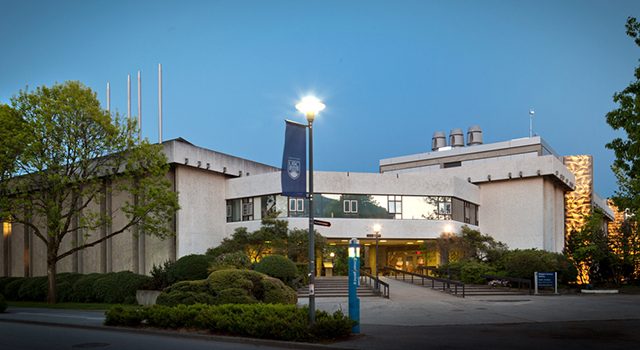Study all aspects of living things and their processes as you learn about the fundamental concepts in Biology. You’ll have a diverse range of courses to choose from, providing insight into the various sub-disciplines such as ecology, human biology, and animal physiology. Specializations within the Biology program range from Animal Biology to Evolutionary Biology to Chemical Biology, and much more.
This program is also offered at UBC's Okanagan Campus
Find out moreWhy this program?
- Offers a broad overview of biology with options to specialize in a sub-field for an Honours degree • Enhance your professional development with Co-Op, summer research opportunities and internships • Strong emphasis on laboratory work, hands-on field research trips, and undergraduate research.
- Prepare for graduate or professional schools such as medical, dental, law, or veterinary medicine.
- Take classes in UBC’s soon-to-completed life science teaching labs.
Program information
Send details- Campus: Vancouver
- Faculty: Faculty of Science
- Degree: Bachelor of Science
- Length 4 yrs
-
Co-op
Yes
You can combine your studies with full-time, paid work at top local and international organizations.
-
Honours
Yes
You can study intense specialization in a single field.
Biology is a broad field dedicated to the study of all aspects of living things and their vital processes. It encompasses the study of animals, plants, insects, and microbes as well as their relationships with their environments. The Biology program at UBC’s Vancouver campus offers an extremely rich range of specialty course options that span the field’s many sub-disciplines. It is overseen by two departments: Botany (in the academic field, one of the largest and strongest in North America) which focuses on plant science; and Zoology, another powerhouse department conducting research and teaching in developmental biology, comparative animal physiology, ecology, and evolution.
Biology is available as a major or honours, with combined major or combined honours available with Computer Science, Chemistry, and Oceanography. There are several honours degrees in Biology specializations as well, including
- Animal Biology
- Cell and Development Biology
- Conservation Biology
- Ecology and Environmental Biology
- Evolutionary Biology
- Marine Biology
- Plant Biology
The honours streams are recommended for students interested in pursuing graduate studies in a biological sciences field.
Experiential learning and research
The Biodiversity Research Centre is a state-of-the-art facility that is home to 50 researchers in disciplines such as evolution, systematics and phylogeny, population and community ecology, fisheries management, conservation biology, and theoretical modeling.
UBC students are able to visit the Beaty Biodiversity Museum for free. The museum is dedicated to promoting the appreciation of biodiversity and making the research conducted by the scientists of UBC’s Biodiversity Research Centre accessible to the public. The museum has more than two million specimens of plants, insects, fish, shells, birds, mammals, and fossils.
Send detailsLife at UBC's Vancouver campus
The Biological Sciences Building contains the Departments of Botany and Zoology. It also houses the Bioimaging Facility, the Herbarium, the Canadian Centre for the Culture of Microorganisms, Stores, and the department’s Mechanical Workshop.
Find out moreYour future
The Biology program is designed to provide you with a strong grounding in several sub-fields of biology and the basic practical skills of the working biologist. It will prepare you for graduate school in various biological sciences disciplines as well as for professional schools (medicine, dentistry, veterinary medicine, law, journalism, etc.).
You’ll learn to analyze and interpret data, apply biological concepts, collect and observe data, conduct field and lab research, write technical reports, and to think analytically and critically.
Program graduates
- PhD candidate in public health and primary care, University of Cambridge
- Dentist, Fairmont Dental Group
- Veterinary medicine and surgery student, University of Edinburgh
- PhD candidate in Microbial Evolution, University of Oslo
- Genetic counsellor, Alberta Health Services
- Research assistant, BC Cancer Agency
- Science and math teacher, St. George’s School
Program requirements
English-language requirements
English is the language of instruction at UBC. All prospective students must demonstrate English-language competency prior to admission. There are numerous ways to meet the English Language Admission Standard.
General admission requirements
IB Diploma Programme
- Completed IB Diploma, including at least three Higher Level courses.
IB Certificate Courses
- IB Certificate courses (Standard and Higher Level) may be used in an admissions average if you are graduating from a recognized high school curriculum that can be used as your basis of admission.
- IB Math Applications and Interpretations SL, or IB Math Studies, do not satisfy the math requirement for admission to UBC’s science-based programs, the Faculty of Management, the UBC Sauder School of Business, or the Vancouver School of Economics.
Degree-specific requirements: Science
- IB Math Analysis and Approaches SL or HL, or IB Math Applications and Interpretations HL (IB Math Applications and Interpretations SL, or IB Math Studies, are not acceptable)
- One of IB Biology, IB Chemistry, or IB Physics
- Grade 11 or equivalent Chemistry, and
- Grade 11 or equivalent Physics (may be waived with grades of 5 in IB Chemistry and in your IB Mathematics course)
Note: Grade 11 Chemistry and Physics requirements listed are only relevant to students who are not completing the equivalent IB Diploma Chemistry and/or Physics courses.
For students studying outside of Canada, some examples of courses that may be accepted as Grade 11 equivalents are junior-level courses for American students, and IGCSE and O Level for those following British-patterned curricula.
Related courses
The following subject categories are particularly relevant for this degree. Consider taking courses in these areas in your junior year and senior year.
- Language Arts
- Mathematics and Computation
- Sciences
